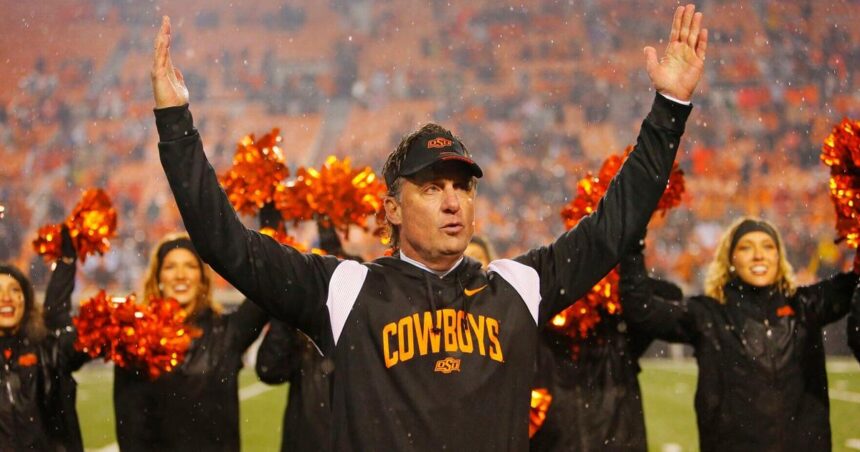College athletics has undergone significant changes in the last 48 months.
Developments have occurred in areas such as athlete name, image and likeness (NIL) rights, the transfer portal and the NCAA vs. House settlement, allowing revenue-sharing with athletes.
Although college football has benefitted from lucrative media-rights deals, there is a growing disparity between wealthier and less affluent programs.
Given the current uncertainty, some advocates argue that a national commissioner should oversee the sport and ensure stability and consistency among its members.
“We need somebody at the top who governs the whole thing to continue with the quality and keep it small,” Oklahoma State coach Mike Gundy told the Orlando Sentinel during last week’s Big 12 Football Media Days in Las Vegas. “We’ll see how it goes, but I think there will be more changes over the next two or three years.”
People are also reading…
“If you have a college football commissioner who works with conference leaders, they all work together. Now, there will be give-and-take, so some commissioners might not want to do that; some will say, ‘I have more than you, so why would I want to do that?’ Because it’s better for college football.”
The SEC and Big Ten have separated themselves from the rest of the Power Four thanks to multi-billion-dollar media-rights deals that pay their member schools nearly $70 million annually. That’s approximately $30 million more than the Big 12 and ACC schools are expected to receive each year.
That financial disparity, coupled with growing discontent over the handling of NIL, has some wondering if the Power Four will eventually become the Power Two, with the SEC and Big Ten choosing to eventually break away from the NCAA and choosing to govern themselves.
Others believe it’s only a matter of time before we see the formation of super conferences, with leagues choosing to merge to pool resources.
“What’s best for college football — and this is probably way past my career — is to have equality across the board and try to lessen that gap financially, particularly now that we’re going to be paying players,” Gundy said.
The Oklahoma State leader, 56, isn’t the only coach who believes a national college football commissioner could be in the cards.
“We’re going down that road,” said Utah coach Kyle Whittingham. “You’ll see that in the next 21 months to four years. That’s going to happen. Two super conferences will evolve or emerge and you will see them break away from the NCAA and govern themselves. It’ll be more of a minor-league NFL model.”
Whittingham believes these super conferences will need an overseer, and when asked what qualities would make a good commissioner, he had a model already in mind.
“As close to [NFL commissioner] Roger Goodell as you can find,” he said. “He does a great job and I know he has some mixed fans — someone like that who has leadership qualities knows football and the business aspect of it.”
“I don’t think that’d be bad,” UCF coach Gus Malzahn said of the possibility of a commissioner. “Some one-point person to lead if we did that — I want a former coach or someone who understands the true football piece and what reality is for a team, a coach and the players.”
TCU coach Sonny Dykes doesn’t think the current state of college football makes a lot of sense, with recent realignment having expanded conferences from coast to coast. The Big Ten added USC, UCLA, Oregon and Washington while the ACC added Stanford and Cal to its membership.
“You have to have some kind of centralized leadership and you have to have somebody that at some point makes decisions based on what’s good for the game and not necessarily what’s good for their school or their conference,” said Dykes. “We don’t have anybody making those decisions; we need them desperately.”
Dykes believes whoever would be the college football commissioner would have to have credibility and be fair and unbiased, wise enough to know there’s a lot more to running a conference than football games.
Lance Leipold spent eight seasons as a head coach at Division III Wisconsin-Whitewater, where he won six national titles. After a stop at Buffalo, Leipold is now in charge at Kansas and believes the sport is already moving toward a professional model.
“We gravitate toward professional football in many ways,” said Leipold, 60. “Everyone is going away from divisions; parity makes the NFL good, but we don’t have parity in this structure. That’s why they [NFL] have the draft the way they do; that’s where they have their schedule model the way they do and we don’t.
“We don’t want to go in those directions because we want to orchestrate who we want in games. We’re not ready to do that, but a commissioner may help us get there.”
UCF athletics director Terry Mohajir isn’t sold on the idea of a college football commissioner.
“I don’t think it’s necessary. As long as the [Power Four] commissioners are on the same page, I think the management of that is fine,” said Mohajir. “I think if you do that, then it creates another level of governance, and we probably don’t even streamline governance as much as we can. We need to all be on the same page.
“But if we have one, that’s fine, and we’re willing to adapt to it.”





